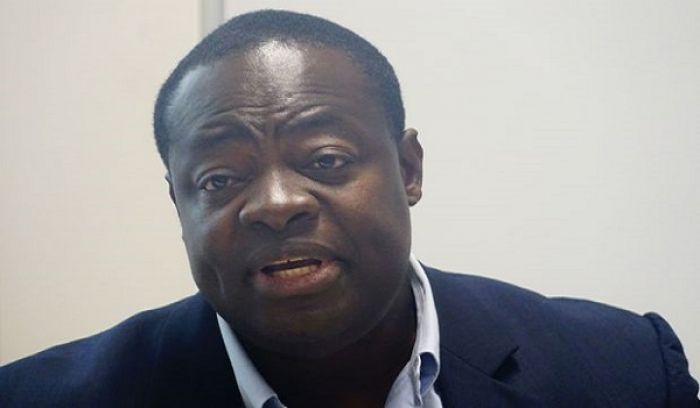PACER Plus negotiators defend process and transparency in Auckland Featured
 Dr Edwini Kessie, Chief Trade Negotiator for the Pacific Photo: RNZ
Dr Edwini Kessie, Chief Trade Negotiator for the Pacific Photo: RNZ
18 August, 2016. Difficulties with negotiating the PACER plus trade agreement for Pacific islands have come to light at a public presentation in Auckland.
The Chief Trade Negotiator for the Pacific Islands, Edwini Kessie, defended the negotiating process and the level of transparency from participating countries, but lamented Papua New Guinea's exit from the discussions.
In the face of criticism he said people had unrealistic expectations of trade agreements and there had been a huge effort to ensure a level playing field at the negotiation table.
Dr Kessie said PACER Plus is badly needed - the Pacific has 0.05 percent share of the world's trade and the region is close to getting an agreement that will lead to a fairer go.
He said it was worth forging ahead even without the Pacific's biggest economy - PNG - and he is hoping it can get on board when the agreement is finalised at the end of the year.
But others say that ship has sailed, and even Dr Kessie said there's been extra efforts to keep the next biggest player - Fiji - happy.
"New Zealand and Australia have been engaging Fiji in the margins of the negotiations to try to resolve and I think they have made good progress," he said.
"A number of the issues have been resolved to the satisfaction of Fiji and I hope that Fiji will soon table their offers."
Auckland University's Associate Professor Yvonne Underhill-Sem said the going has been tough, given there are are range of countries, as small as Niue and as large as PNG.
She said even the sub-regional Melanesian Spearhead Group has seen its own free trade agreement splinter, with PNG preferring bilateral arrangements.
And despite her concerns, Ms Underhill-Sem said PNG had every right to keep its distance from PACER Plus.
"I'm not entirely convinced PNG has got it right in the way it needs to go. I have some real concerns with the way it's dealing with extractors at the moment so I wouldn't say it's on the right road but it's got the sovereign right to do that," she said.
"And I think that by locking itself into something like PACER Plus, it loses some of its sovereignty and why would you want to do that?"
She said helping PNG protect its commodities and deal with extractors was completely different to encouraging agricultural growth in countries like Tonga, Niue and Samoa.
"There is so much diversity around the Pacific that we need to focus on each country and ask where does trade fit in its wider development aspirations?"
There has been criticism that the trade agreement might impose World Trade Organisation standards on countries that don't have the capacity to handle them, and there's not enough emphasis on development.
But Dr Kessie said people have unrealistic expectations on trade agreements and they are not a panacea.
He said PACER Plus is a framework that imposes little and gives countries plenty of flexibility to protect their own industries and revenue streams.
New Zealand's chief negotiator Tessa Te Mata said there are more resources going into this trade agreement than with any other region or country and the idea of aid and development is at its core.
She said the proof was already there with increased commitments to bring more Pacific workers to Australia and New Zealand.
"We aren't waiting for Pacer Plus to be signed. There's not many trade agreements in the world where we start rolling out the benefits before we actually sign the agreement," she said.
We've got a couple of pilots underway - crews on ships and looking at the Canterbury rebuild. So we are not just looking at the RSE workers we are looking at what other possible labour skills the Pacific can help New Zealand with."
And in the face of criticism that New Zealand is not doing enough to help Pacific exporters get their product through the tough quarantine standards, she said New Zealand has heard those voices and is working towards doing more.
"These things take time, we are getting requests from all over the world. It's not just from the Pacific, and the Pacific proportionately has more resources dedicated to processing their requests than any other region in the world. We are doing as much as we can and we are looking at ways to do more," she said.
"New Zealand is not slacking on this, I mean the Pacific are our nearest neighbours, it's in New Zealand's interests to see a more prosperous Pacific."
But Yvonne Underhill-Sen said no matter how much effort the Australian and New Zealand governments make to accede to Pacific demands, the agreement opens the door to private sector service providers who are primarily self-serving.
She said despite the intention of developing Pacific industries, the reality is that projects are still dominated by Australian and New Zealand insurers, telecommunications companies and construction firms.
"So while the government on the one hand is negotiating from a government point of view it opens up the door for the self interest of Australian and New Zealand companies," she said.
"And we can't forget also that Australia and New Zealand are very clear in their development policies. Their development policy is first and foremost to take care of their own patch."
She said it's hard to judge the value of PACER Plus when so little detail is publicly available, but Dr Kessie defended the level of transparency and said there was no rule on secrecy.
"It is up to each and every country to share the texts with their own constituencies so there's nothing banning any country from sharing the texts and I think the degree of transparency, I would say has been very high in the PACER Plus negotiations."
Dr Kessie said he hopes next week in Christchurch that labour mobility provisions will be finalised and the agreement will be another step closer.
But he said the onus is on individual countries to create policies to lift their own economies and PACER plus is not an aid package.
-RNZI



